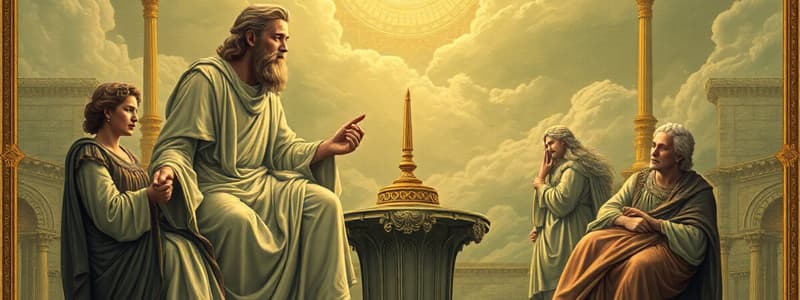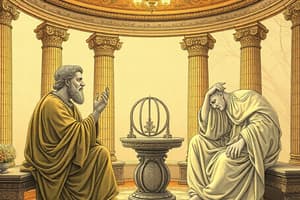Podcast
Questions and Answers
What role does the myth play in Protagoras's belief regarding virtue?
What role does the myth play in Protagoras's belief regarding virtue?
- It suggests that virtue is determined by inherent qualities.
- It implies that virtue is only attainable through divine intervention.
- It emphasizes that virtue can be learned through education. (correct)
- It argues that virtue is fixed and unchanging.
How does the myth contribute to Protagoras's view on morality?
How does the myth contribute to Protagoras's view on morality?
- It suggests that morality is an objective truth.
- It supports the idea that morality is culturally constructed. (correct)
- It provides a universal definition of morality applicable to all cultures.
- It indicates that morality is irrelevant in educational settings.
What does Protagoras's emphasis on human interdependence highlight?
What does Protagoras's emphasis on human interdependence highlight?
- The irrelevance of community in personal growth.
- The significance of societal structures in ethical behavior. (correct)
- The individualism of self-education.
- The primacy of competition in human interactions.
What implication does the myth have regarding education and virtue?
What implication does the myth have regarding education and virtue?
In what way does the myth reflect early Greek democratic ideals?
In what way does the myth reflect early Greek democratic ideals?
What does the myth in Plato's Protagoras emphasize about human virtue?
What does the myth in Plato's Protagoras emphasize about human virtue?
According to the myth, what key gift do the gods Prometheus and Epimetheus bestow upon humanity?
According to the myth, what key gift do the gods Prometheus and Epimetheus bestow upon humanity?
Which concept contrasts sharply with the idea of virtue being biologically determined?
Which concept contrasts sharply with the idea of virtue being biologically determined?
What key role do the gods play according to the myth?
What key role do the gods play according to the myth?
What does the division between humans and animals in the myth signify?
What does the division between humans and animals in the myth signify?
How is the concept of cooperation portrayed in the myth?
How is the concept of cooperation portrayed in the myth?
What does the myth suggest about the potential for virtue in all humans?
What does the myth suggest about the potential for virtue in all humans?
What aspect of education is highlighted in the myth?
What aspect of education is highlighted in the myth?
Flashcards
Virtue is Teachable
Virtue is Teachable
Protagoras believes that virtue can be taught and learned through education and practice.
Nomos and Morality
Nomos and Morality
The myth highlights the importance of society and its laws (nomos) in establishing ethical conduct.
Relativism in Morality
Relativism in Morality
Protagoras argues that morality is not innate, but rather formed through cultural norms and expectations.
Pragmatic Approach to Ethics
Pragmatic Approach to Ethics
Signup and view all the flashcards
Education and Virtue
Education and Virtue
Signup and view all the flashcards
Protagoras Myth
Protagoras Myth
Signup and view all the flashcards
Human's Unique Capacity
Human's Unique Capacity
Signup and view all the flashcards
Divine Gift of Techne
Divine Gift of Techne
Signup and view all the flashcards
Human Vulnerability
Human Vulnerability
Signup and view all the flashcards
Social Construction of Virtue
Social Construction of Virtue
Signup and view all the flashcards
Nomos vs. Physis
Nomos vs. Physis
Signup and view all the flashcards
Gods' Role in the Myth
Gods' Role in the Myth
Signup and view all the flashcards
Potential for Virtue
Potential for Virtue
Signup and view all the flashcards
Study Notes
The Protagoras Myth
- The myth in Plato's Protagoras is a foundational narrative explaining the origin of human virtue and the role of the gods in its development.
- It's presented by Protagoras, a renowned Sophist, to illustrate his ethical and pedagogical approach.
- The myth posits a shared divine origin for humanity, differentiating humans from animals through the inherent capacity for learning and reason.
- A significant element is the bestowal of a special divine gift, the capacity for art and wisdom (techne), by the gods Prometheus and Epimetheus.
- Human beings initially lack the necessary tools and skills for survival and flourishing.
- This emphasizes the requirement for human cooperation and the necessity of learning from others, thus highlighting the role of education in cultivating virtue.
- The myth presents a strong argument for the societal context of human development, implying that virtue is not an innate quality but rather a product of social and cultural interaction.
- Protagoras argues humans are inherently suited for cooperation and that it is through communal interactions that individual virtues like justice and temperance manifest and develop.
- The myth stresses the importance of nomos (law and custom), as opposed to physis (nature), in shaping human character and ethical conduct. This contrasts with a purely biologically determined approach to ethics.
- The myth depicts the god's role as initiators of the human condition, not as arbiters of morality or agents of retribution.
- The myth culminates with the argument that all humans inherently possess the potentiality for virtue and that their potential is primarily developed through social interactions and societal structures.
- The myth has been interpreted by scholars as a complex allegory highlighting the social construction of values and the importance of human agency.
Key Elements of the Myth
- The gods, represented by figures like Prometheus and Epimetheus, play a central role in the origin of humanity, yet they are not seen as direct moral guides.
- The myth introduces a sharp division between humans and animals, emphasizing human unique capacity for reason and learning.
- Human's lack of natural defenses or instincts is a key theme highlighting their dependence on social structures.
- The theme of art and wisdom (techne) is central to the myth as a fundamental tool for human survival and prosperity.
- The myth provides a powerful framework for understanding ethical and pedagogical principles and underpins Protagoras's belief that humans can learn virtue through education and practice.
Implications for Protagoras's Philosophy
- The myth serves as a springboard for Protagoras' ethical views, suggesting that virtue is teachable and attainable through human effort.
- It underscores the importance of societal education and norms (nomos) in shaping humane conduct.
- The narrative supports Protagoras' relativistic perspective on morality, suggesting that morality is not inherent but culturally constructed.
- It also showcases Protagoras's pragmatism. The emphasis on human interdependence is directly related to the importance of societal structures in shaping ethical behavior and individual well-being.
- The myth is a significant argument in establishing the critical role of education in promoting and cultivating virtue.
- It aligns with the ideas of early Greek democratic ideals with its focus on human potential and shared ability to learn and improve collectively.
Studying That Suits You
Use AI to generate personalized quizzes and flashcards to suit your learning preferences.




